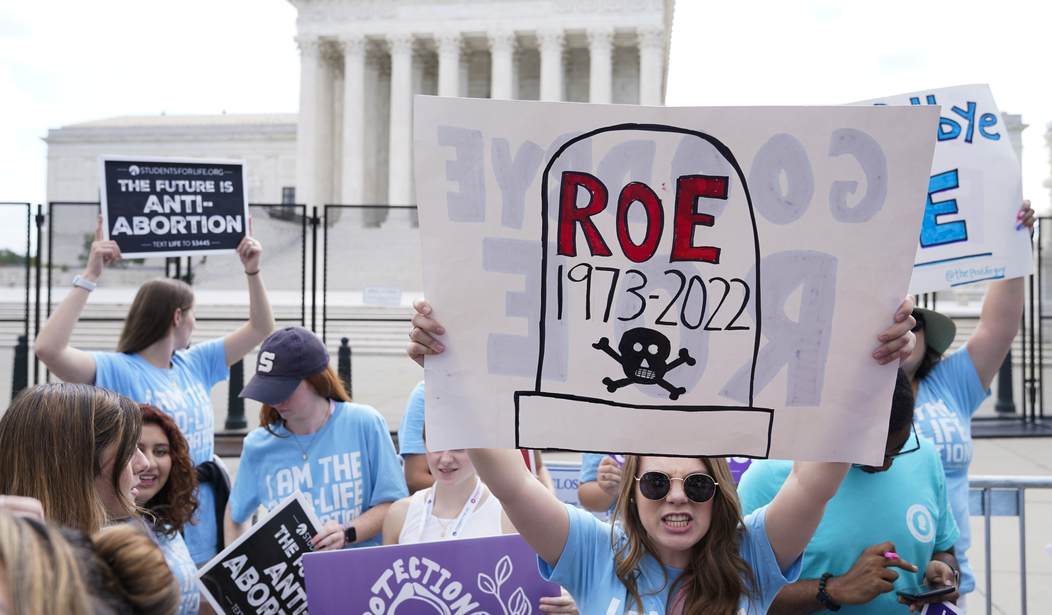On Tuesday, a Superior Court Judge in Fulton County, Ga., declared Georgia’s six-week abortion ban, often referred to as the “heartbeat bill,” unconstitutional.
Judge Robert McBurney enjoined the law on a technicality, insisting that the law violates the state constitution because the legislature passed it before the Supreme Court overturned Roe v. Wade and returned the issue of abortion back to the states.
“At that time — the spring of 2019 — everywhere in America, including Georgia, it was unequivocally unconstitutional for governments — federal, state, or local — to ban abortions before viability,” McBurney wrote in his ruling, adding that the only way such a law can go on the books is for the General Assembly to pass a new version of it “in the sharp glare of public attention.”
Georgia’s General Assembly passed the LIFE Act in 2019, and Gov. Brian Kemp signed it into law soon after. The law bans abortions after a doctor or other medical professional can detect a heartbeat, which generally occurs at around six weeks into the pregnancy.
An Obama-appointed judge blocked the law in 2020, but a three-judge panel of the 11th Circuit Court of Appeals allowed the law to proceed less than a month after the Supreme Court’s Dobbs ruling put abortion laws back in the hands of the 50 states.
Naturally, the pro-abortion crowd crowed about the judge’s ruling.
Georgia's abortion ban ruled UNENFORCEABLE. The enormity of this victory is worth celebrating.
Please know, we will continue to fight so that every person in Georgia can receive the care they deserve without fear of prosecution or harm.https://t.co/PnX1ZtzNr9
— Alexis McGill Johnson (@alexismcgill) November 15, 2022
Conservatives and pro-lifers in the state are reacting differently than abortion groups.
“Yesterday’s ruling places the personal beliefs of a judge over the will of the legislature and people of Georgia,”said a spokesperson for Gov. Brian Kemp’s office. “The state has already filed a notice of appeal, and we will continue to fight for the lives of Georgia’s unborn children.”
“A radical Fulton County Superior Court judge has enjoined our Heartbeat Law, preventing Georgia from enforcing this law which was reducing abortion by 52% in our state!” wrote Cole Muzio, president of Frontline Policy Council, in an email to supporters. “This judge, preening for higher appointment, uses twisted logic to say, essentially that ‘because our law was passed pre-Dobbs, that it is invalid.’”
Related: Federal Court Allows Georgia’s Heartbeat Bill to Proceed
It does seem odd that a county judge would issue an injunction on a state law that a federal court has ruled could proceed, but the issues that Judge McBurney raised involve the state constitution, which fast-tracks an appeal to the Georgia Supreme Court.
McBurney also only challenged the abortion aspects of the law; the rest of it remains intact pending appeal. This means that the personhood status of all Georgians, unborn and born, still stands under the law. The Child Tax Credit for unborn babies remains in effect, as does the requirement that medical professionals inform the mother of the detection of a heartbeat in her unborn child. Mothers can still seek child support for their unborn children as well.
While the fight rages on, Elizabeth Edmonds, leadership director of the Georgia Life Alliance, told PJ Media that there’s still plenty to be encouraged by in light of McBurney’s decision.
“People are talking about this, but this is a really big win for the pro-life community because this is what we’ve been fighting for,” Edmonds told PJ Media. “I mean, for 50-plus years we’ve been fighting for the personhood of the unborn child to be recognized, and we now remain the only state in the nation that has solidified personhood from the moment of fertilization for the unborn child from conception to natural death. Persons are persons under Georgia’s law.”
“And the good news of that is that a lot of the law is still considered valid,” she added.
Attorney General Chris Carr has already filed an appeal on behalf of the state of Georgia — “And it was almost immediate, I think, within an hour,” Edmonds said — and has vowed to continue protecting the unborn.
“We have filed a notice of appeal and will continue to fulfill our duty to defend the laws of our state in court,” said Kara Richardson, spokesperson for Carr, in a statement.
The appeal goes to the Georgia Supreme Court, but it could take some time to make its way to the court.
“Obviously, they have to file the preliminary things, and the state supreme court has to decide whether or not they’re even going to hear the case,” said Edmonds. “We’re positive that they will. We know at least three of the justices are incredibly pro-life, so I feel like they are going to take up this case because it is a valid question. We’ve got claims that state law is in violation of the Georgia state constitution, but really what’s at stake here is the right to life of the unborn child versus the right to privacy and bodily autonomy of the woman — rights kind of in conflict.”
What can pro-lifers do as we wait for the court to hear the appeal?
“I definitely think you know, following pro-life groups on social media or their email list, just staying updated and involved on what’s going on” is the advice that Edmonds gave.
There isn’t much else that the General Assembly can do while the law awaits appeal, “So, unfortunately, it’s kind of just a hurry up and wait and pray,” she added.
Praying is something we can all do as Georgia continues to fight for the lives of both the unborn and those already born.










Join the conversation as a VIP Member